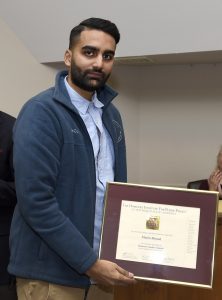Probiotics and the Cardiovascular System

BCOM faculty member Suresh Antony, MD, and third year medical student Marlina Ponce de Leon collaborated on a chapter for a recently published textbook on probiotics. “I approached Dr. Antony about doing a case study, but at that time he has just been asked to write this chapter and he asked me if I was interested in the opportunity to assist him,” Ponce de Leon said. “Dr. Antony had already done the majority of the background research and had a collection of over 30 research papers on the topic. He asked me for assistance in writing a literature review.”
She and Dr. Antony then collaborated on completing the chapter and worked with the global publishing company IntechOpen to edit and revise their submission. The book, Probiotics: Current Knowledge and Future Prospects, edited by Shymaa Enany, was published in July 2018.
Dr. Antony and Ponce de Leon’s chapter is entitled “Probiotics and Its Relationship with the Cardiovascular System” and covers the use of probiotics in the treatment and prevention of cardiovascular related diseases such as diabetes, hypertension, and cardiomyopathy.
Probiotics: Current Knowledge and Future Prospects is available for purchase at: intechopen.com/books/probiotics-current-knowledge-and-future-prospects
Increasing Underrepresented Populations in the Physician Workforce

Third year medical student Harris Ahmed’s policy white paper entitled, “Increasing physician workforce among underrepresented populations, with emphasis on low socioeconomic Native and Hispanic populations,” was recently published in the New Mexico State University’s Library Archives.
Last year, Ahmed was selected for the Pete V. Domenici Institute for Public Policy’s Domenici Student Scholars Program and he served as a student panelist for the 2017 Domenici Public Policy Conference. He was required to complete a white paper on the topic of his choice. Ahmed’s paper “presents an integrated, multi-faceted approach that begins in elementary and middle schools, and highlights the importance of factors such as medical school student organization involvement, a holistic medical school admissions process, and increasing loan forgiveness for service program funding.”
“It is my hope that institutions, legislators, accrediting bodies, and researchers can utilize these recommendations to help solve the issue of diversity in medicine and the issues that come with patient care without said diversity,” Ahmed explained. “My personal experiences growing up in southern California, studying in Las Cruces, and rotating in Tucson have enabled me to see firsthand the benefit of developing a diverse physician workforce in the Borderlands. BCOM’s commitment to this region through linkage programs like the BEAR Pathway and the Osteopathic Medicine Pathway Program, along with the immense success of student organizations in engaging local students, are mentioned as a model to emulate nationwide. Also included in the white paper are interviews I conducted with BCOM students John Rajala, Mariah Maestes, Delayna Garcia, and Roxanne Waggoner.”





